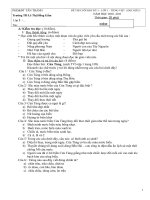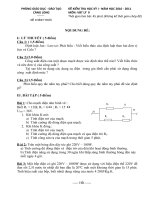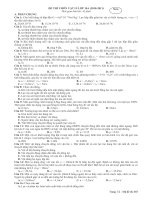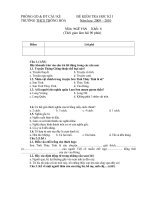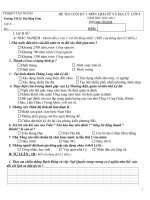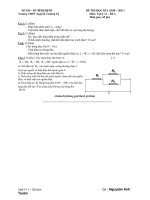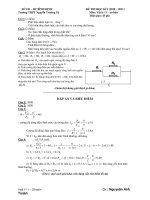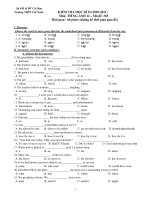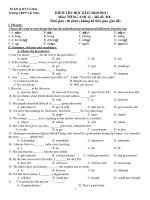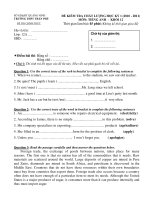ĐỀ THI HỌC KỲ I 2010- 2011 MÔN TIẾNG ANH - 12 ppt
Bạn đang xem bản rút gọn của tài liệu. Xem và tải ngay bản đầy đủ của tài liệu tại đây (71 KB, 5 trang )
1
Sở Giáo dục & Đào tạo Lâm Đồng
ĐỀ THI HỌC KỲ I 2010- 2011
MÔN TIẾNG ANH - Lớp 12 CB
Mã đề 121
I- LANGUAGE FOCUS (4pts)
Circle the letter (A, B, C or D) to indicate the correct answer to each of the following questions.
Question 1: He refused to give up work _____________he had won a million pounds.
A. despite B. however C. as though D. even though
Question 2: I haven't seen her _________she was a little girl.
A. when B. as C. since D. while
Question 3: “What did John do after he fell?'" "He kept ____________despite his pain."
A. run B. to run C. running D. being run
Question 4: I was ___________angry to argue with him.
A. so B. very C. quite D. too
Question 5: He is old enough to take ____________for what he has done.
A. responsible B. responsibility C. responsibly D. irresponsibly
Question 6: One of the typical _____________of the Vietnamese culture is worshiping ancestors.
A. measures B. methods C. features D .advantages
Question 7: Try to reduce the feeling of pressure and make a good impression _____________ your
interviewer.
A. in B. for C. on D. at
Question 8: I suggest we __________outside the cinema tomorrow at 8:30.
A. meeting B. meet C. will meet D. met
Question 9: You look ill. What's wrong with you?”. "________________"
A. No, sir B. No matter C. Thank you D. Nothing
Question 10: Brenda learned to play _________piano when she was at ____________ university.
A. Ø / the B. the / the C. the / Ø D. the / an
Question 11: "Excuse me." "____________"
A. Please B. No, I'm not C. Yes? D. Yes, I am
Question 12:. The police questioned the woman _____________handbag was stolen.
A. whose B. whom C. which D. that
Question 13: Mr. Brown ___________a car if he had enough money.
A. will buy B. would buy C. bought D. had bought
Question 14: 1 read a book by a friend of mine.
A. was written B. written C. wrote D. which wrote
Question 15: I'll get angry __________ you make more mistakes.
A. unless B. if C. because D. though
Circle the letter (A, B, C or D) to indicate the word whose underlined part is pronounced differently
from that of the rest in each of the following questions.
Question 16: A. stopped B. failed C. watched D. passed
Question 17: A. doors, B. shops C. hates D. cooks
Question 18: A. inflation B. maximum C. applicant D. inhabitant
Circle the letter (A, B, C, or D) to indicate the word whose main stress is placed differently from that
of the rest in each of the following questions,
Question 19: A. confide B. precede C. maintain D. nursery
Question 20: A. psychology B. mathematics C. economics D. archeology
2
II. READING (3pts)
Read the following passage and circle the letter (A,B,C or D) to indicate the correct answer to each
of the questions below.
"Where is the university?" is a question many visitors to Cambridge ask, but no one can give them a
clear answer, for there is no wall to be found around the university. The university is the city.
You can find the classroom buildings, libraries, museums and offices of the university all over the city. And
most of its members are the students and teachers or professors of the thirty-one colleges.
Cambridge was an already developing town long before the first students and teachers arrived 800 years
ago. It grew up by the river Granta, as the Cam was once called. A bridge was built over the river as early as
875.
In the fourteenth and fifteenth centuries more and more land was used for college buildings. The town
grew much faster in the nineteenth century after the opening of the railway in 1845. Cambridge became the
city in 1951 and now it has the population of over 100,000. Many young students want to study at
Cambridge. Thousands of people from all over the world come to visit the university town. It has become a
famous place all around the world.
Question 1: Why do most visitors come to Cambridge?
A. To see the university B. To study in the colleges in Cambridge.
C. To find the classroom buildings. D. To use the libraries of the university.
Question 2: Around what time did the university begin to appear? ,
A. In the 8th century. B. In the 9th century.
C. In the 13th century. D. In the 15th century.
Question 3: Why did people name Cambridge the "city of Cambridge"?
A. Because the river was very well-known. B. Because there is a bridge over the Cam.
C. Because it was a developing town. D. Because there is a river named Granta.
Question 4: After which year did the town really begin to develop?
A. After 800 B. After 875 C. After 1845 D. After 1951
Question 5: From what we read we know that now Cambridge is___________.
A. visited by international tourists B. a city without wall
C. a city of growing population. D. a city that may have a wall around
Read the following passage and circle the letter (A, B,C or D) to indicate the correct word for each
of the blanks.
Around the age (6)_________sixteen, you must make one of the biggest decisions of your
life. Do I stay on at school and hopefully, go on to university later? Do I leave and start work or
beginning a training (7)________?
The decision is yours, but it may be (8)__________remembering two things: there is more
unemployment (9)_________those who haven't been to university, and people (10)_________have
the right skills will have a big advantage in the competition for jobs. If you decide to go straight into a
job, there are (11)_________opportunities for training. Getting qualifications will
(12)__________you get on more quickly in many careers, and evening classes allow you to learn
(13)_________you earn. Starting work and taking a break to study when you are older is
(14)___________possibility. This way, you can save up money for your student days, as well as
(15)_________practical work experience.
Question 6:
Question 7:
Question 8:
Question 9:
A. at
A. school
A worth
A. between
B. in
B. class
B. necessary
B. among
C. on
C. course
C. important
C. with
D. of
D. term
D. useful
D. through
3
Question 10:
Question 11:
Question 12:
Question 13:
Question 14:
Question 15:
A. whom
A. much
A. permit
A. where
A. also
A. getting
B. which
B. many
B. help
B. while
B. again
B. making
C. who
C. little
C. let
C. when
C. another
C .taking
D. whose
D. few
D. give
D. what
D. always
D. doing
III. WRITING (3pts)
Circle the letter (A, B, C or D) of the underlined word or phrase which is not correct.
Question 1: The course begins at 7 January and ends some time in April.
A B C D
Question 2: I always talk to my parents before doing an important decision.
A B C D
Question 3: We are studying at a high school where is very famous in the country.
A B C D
Question 4: Though our poor living conditions, we all feel happy.
A B C D
Question 5: If John had passed the GCSE examination, he would have allowed to take the entrance
A B C
examination to the university.
D
Write complete sentences, using the words or phrases given and making any changes and additions
if necessary.
Question 6: The last time /we / eat / this restaurant / be/ six months / ago.
Question 7: A happy marriage / should / based/ love.
Question 8: When the boy / be / twelve / his father / die / dangerous disease.
Rewrite each of the following sentences in such a way that each has the same meaning as the origin
alone.
Question 9: How long is it since they bought the house?
When ____________________________________________________________________
Question 10: I wasn't hungry so 1 didn't eat anything.
If ________________________________________________________________________
Question 11: People say that the Great Wall of China was built in the late of 1400s.
The Great Wall of China ______________________________________________________
Question 12: I'm sorry I gave you the wrong number," said Paul to Susan.
Paul apologized _____________________________________________________________
Question 13: She started learning Japanese two months ago.
She has ___________________________________________________________________
Question 14: If it doesn't rain soon, the crops will be lost.
Unless ____________________________________________________________________
Question 15: "Why didn't you make an appointment earlier?" The doctor asked her.
The doctor asked her ________________________________________________________
-THE END-
4
SỞ GIÁO DỤC & ĐÀO TẠO LÂM ĐỒNG
KIỂM TRA HỌC KỲ I NĂM HỌC 2009- 2010
MÔN: TIẾNG ANH - LỚP 12
MÃ ĐỀ 121
HƯỚNG DẪN CHẤM ĐỀ CHÍNH THỨC MÔN TIẾNG ANH 12
(CHƯƠNG TRÌNH CƠ BẢN)
* 0.2 pt for each correct answer.
I. LANGUAGE FOCUS ( 4pts)
Circle the letter (A, B, C or D) to indicate the correct answer to each of the following questions.
Question 1: D. even though
Question 2: C. since
Question 3: C. running
Question 4: D. too
Question 5: B. responsibility
Question 6: C. features
Question 7: C. on
Question 8: B. meet
Question 9: D. Nothing
Question 10: C. the/ Ø
Question 11: C. Yes?
Question 12: A. whose
Question 13: B. would buy
Question 14: B. written
Question 15: B. if
Circle the letter (A, B, C or D) to indicate the word whose underlined part is pronounced differently
from that of the rest in each of the following questions.
Question 16: B. failed
Question 17: A. doors
Question 18: A. inflation
Circle the letter (A, B, C, or D) to indicate the word whose main stress is placed differently from that
of the rest in each of the following questions.
Question 19: D. nursery
Question 20: A. psychology
II. READING (3pts)
Read the following passage and circle the letter (A, B, C or D) to indicate the correct answer to each
of the questions below.
Question 1: A. To see the university
Question 2: C. In the 13th century.
Question 3: B. Because there is a bridge over the Cam.
Question 4: C. After 1845
Question 5: A. visited by international tourists
5
Read the following passage and circle the letter (A, B,C or D) to indicate the correct word for each of the
blanks.
Question 6: D. of
Question 7: C. course
Question 8: A worth
Question 9: B. among
Question 10: C. who
Question 11: B. many
Question 12: B. help
Question 13: B. while
Question 14: C. another
Question 15: A. getting
III. WRITING (3pts)
Circle the letter (A, B, C or D) of the underlined word or phrase which is not correct.
Question 1: A at
Question 2: C doing
Question 3: B where
Question 4: A Though
Question 5: B would have allowed
Write complete sentences, using the words or phrases given and making any changes and additions if
necessary.
Question 6: The last time we ate in this restaurant was six months ago.
Question 7: A happy marriage should be based on love.
Question 8: When the boy was twelve his father died of a dangerous disease.
Rewrite each of the following sentences in such a way that each has the same meaning as the original
one.
Question 9: When did they buy the house?
Question 10: If I had been hungry, I would have eaten something.
Question 11: The Great Wall of China is said to have been built in the late of 1400s.
Question 12: Paul apologized to Susan for giving/ having given her the wrong number.
Question 13: She has been learning/ has learnt Japanese for two months.
Question 14: Unless it rains soon, the crops will be lost.
Question 15: The doctor asked her why she hadn't made an appointment earlier.
